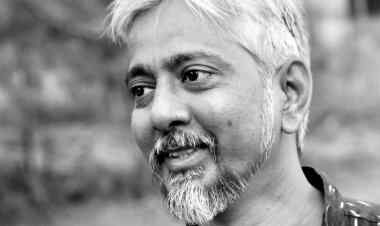Tide is Rising. Change is Coming. 'Nonajoler Kabbo'
Shoma A. Chatterji writes, 'The film portrays an epic clash‐of‐cultures in the climate frontlines of Bangladesh, with the elemental conflict of land and sea, man and nature, serving as an interactive setting for a dramatic meditation on tradition and modernity.'

After receiving acclaim at many international film festivals last year, Nonajoler Kabbo will be released in Bangladesh on November 26th, 2021. The film will be distributed by Star Cineplex. The film stars Titas Zia, Fazlur Rahman Babu, Shatabdi Wadud, and Tasnova Tamanna as the main protagonists. The background score was composed by music director Arnob.
London, Busan, Göteborg, Seattle, Sao Paolo, Torino, and Singapore are some of the major festivals where ‘Nonajoler Kabbo’ has made a mark. The film is now going beyond the borders of the festival circuit, and it is on its way to this year’s UN Climate Conference COP26. This momentous event will take place in Glasgow, Scotland. The first screening of ‘Nonajoler Kabbo’ will take place in front of young climate leaders from all across the world at the UN Climate Conference of Youth COY16. The second screening will be held at Cinema Auditorium (IMAX theatre), which is located within the official COP26 Green Zone. Most of the world leaders are scheduled to attend this conference. The Honorable Prime Minister of Bangladesh Sheikh Hasina will attend as well.
The film portrays an epic clash‐of‐cultures in the climate frontlines of Bangladesh, with the elemental conflict of land and sea, man and nature, serving as an interactive setting for a dramatic meditation on tradition and modernity. Director Sumit believes that film and entertainment can be a powerful tool for bringing beneficial changes to society and culture, as well as for raising awareness about the dangers of climate change. This
This conviction inspired him to create ‘Nonajoler Kabbo’.
"I travelled to a remote fishing community in Patuakhali three years ago to make this film," Sumit explains. "I'm sorry to inform you that the coastal village where we shot ‘Nonajoler Kabbo’ no longer exists. For 1.5 years, I was unable to return to the location due to the pandemic. When I returned to that beloved place, to those beloved people, all I found were some broken tree branches and the rising tide. I learned that the sea level in this area has risen dramatically in the last 2-3 years. The high tide is regularly eroding the land, and Cyclone Amphan last year wreaked havoc."
These unfavourable conditions may not harm the commercial Hilsha catch in deep waters, but they are gradually reducing the artisanal fishermen's source of income. They are not only losing their ability to cope with nature, but also losing their patience. They are moving to the cities in search of work.
Sumit says, “I met some of the brothers & sisters of the fishing village who acted in Nonajoler Kabbo. They told me that even the Hilsha fish isn't as plentiful as it used to be. I discovered that the awful reality of their lives is far more severe than my film's story. I want to tell the world about these people's suffering, which is why I applied for the United Nations Climate Conference. I'd want to express my gratitude to the organizers for allowing my film to highlight the narrative of the artisanal fishing community. 'Nonajoler Kabbo' has turned out to be an epic story from the front lines of the fight against climate change."
"I performed the character of a Chairman in this film. It was an incredible opportunity to immerse myself in coastal life." Fazlur Rahman Babu made a statement. "Quality films can only be made if we approach our parts with honesty and integrity. ‘Nonajoler Kabbo’, I believe, will add a new feather to our caps. I'd like to extend an invitation to all moviegoers to come to the theatre and see the picture that we've all worked so hard on."
Nonajoler Kabbo was produced by Rezwan Shahriar Sumit & French producer Ilann Girard. Ilann’s credits include ‘March of the Penguin’, ‘Goodbye Bafana’, and ‘Final Portrait’. The film features stunning visuals shot by Chananun Chotrungroj, a talented Thai cinematographer who won Best Cinematography at Tribeca for her work on ‘Materna’. She received a Spirit Award nomination for ‘The Third Wife’ in 2020. The film’s editor, Academy Member Kristan Sprague’s latest film ‘Judas and the Black Messiah’ was nominated for six Oscars, including Best Picture this year. Rezwan Shahriar Sumit, the film’s Bangladeshi writer and director, received a writing grant from Spike Lee who provided him with mentorship at the Grad Film Program of NYU Tisch.

Image: filmmaker Rezwan Shahriar Sumit
Awards & Grants:
· Winner – NETPAC Award (Best Asian Feature), Kolkata International Film Festival
· Winner - Spike Lee Writing Grant 2016.
· Winner - CNC Aide aux cinémas du monde 2018. (€80,000)
· Winner - Bangladesh's National Film Grant / Anudan 2017. ($62,500)
· Winner - TFL Audience Design Fund 2020. (€45,000)
· Selection - TFL Audience Design Workshop 2020.
· Selection - Film Bazaar's Co-Production Market 2016.
***
About the author: Dr. Shoma A. Chatterji is an Indian film scholar and author based in Kolkata.
What's Your Reaction?

































































